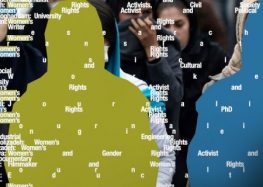Fabrication in Iranian Reports on Wall Street Journal Reporter Exposed
False Allegations Are Attempt to Justify Coming Verdict against Washington Post Reporter Rezaian
After a week of attacks by the hardline Iranian newspaper Kayhan against Wall Street Journal reporter Farnaz Fassihi, the American newspaper issued a statement condemning the allegations as “completely false, outlandish and irresponsible.”
On August 12, 2015, the Kayhan newspaper published a front-page report supposedly based on an article by American commentator Michael Ledeen claiming that US Senator Chuck Schumer of New York had been in contact with leaders of the Iranian Green Movement (which grew out of the disputed presidential election in Iran in 2009) through an intermediary at the Wall Street Journal.
“If we look a bit carefully,” Kayhan wrote, “we see the contact person is no one other than the reporter who in 2009 was sent on a mission to Tehran by the Wall Street Journal to cover news of the Iranian presidential elections. This reporter’s name is Farnaz Fassihi, who entered Iran two months before the election and then got busy,” Kayhan wrote.
However, Kayhan got the facts wrong. Michael Ledeen’s article in Forbes magazine referred to a “friend on Wall Street” not the Wall Street Journal. It appears Kayhan’s translators confused Manhattan’s financial district with the newspaper and then concocted a story to smear a prominent award-winning journalist.
“The account in the Forbes opinion piece that is the basis for these accusations simply never happened,” Radio Free Europe quoted Matt House, a spokesman for Senator Schumer.
The attacks against Farnaz Fassihi have coincided with the ending of the trial in Iran of Washington Post reporter Jason Rezaian, who has been imprisoned there since July 22, 2014, on trumped-up espionage charges for which the Iranian judicial authorities have failed to present any proof. A verdict is expected within days.
“The manufactured charges against a credible Iranian-American journalist by Kayhan shows how this newspaper and other like-minded outlets fear independent reporting by the international media in Iran,” said Hadi Ghaemi, executive director of the International Campaign for Human Rights in Iran.
“This fraudulent scenario is a continuation of the long-standing practice by the Iranian authorities of defaming and discrediting any independent voices, and particularly an effort to cast aspersions against Iranian-American reporters in order to justify the accusations against Jason Rezaian,” Ghaemi added. “But the amateurish hand of the writers has been exposed and their ridiculous claims have been quickly dismissed.”
Kayhan has not yet responded to the facts presented against its false allegations. Nor has it made any reference to clarifications from Michael Ledeen and the Wall Street Journal.
Kayhan’s accusations against Fassihi were reprinted by other news outlets affiliated with Iran’s Revolutionary Guards, such as the Javan newspaper and the Tasnim News Agency. Resalat newspaper also interviewed Iranian Members of Parliament to get their reaction to Kayhan’s false report.
In an article titled “The Report Card of a Woman of Iranian Descent: From Fabricating the Name of the Persian Gulf to Giving Seditious Reports,” the Tasnim News Agency repeated Kayhan’s false assumption that the supposed intermediary in Ledeen’s piece was from the Wall Street Journal.
The news agency described the Wall Street Journal’s Iranian-American reporter as a woman active in anti-Iranian affairs “who has carried out special work during the 2009 Sedition [the term hardline authorities use for the widespread peaceful protests that followed the disputed results of the presidential election in Iran that year] and compiled reports against our country. Farnaz Fassihi is someone whose scope of anti-Iranian activities is very wide and she has published hundreds of articles and reports against our country in that newspaper.”
Tasnim’s article also alleged that during the 2009 disturbances, Fassihi had described the detention and trial of reformist figures as illegal and degrading, and equated the expulsion of student activists with an act of war.
The mass detentions of peaceful protesters and the forced confessions that followed the 2009 elections were the subjects of many articles by independent reporters at the time. Fassihi was not the only reporter, domestic or foreign, who covered these subjects, as well as reporting on the plight of students prevented from continuing their studies because of their peaceful activism.
On August 16, 2015, the hardline Resalat newspaper published an interview with Member of Parliament Alaeddin Boroujerdi, head of the Parliamentary National Security and Foreign Policy Committee, where he described reporters like Farnaz Fassihi as mercenaries “if the alleged reports are based on documented facts.”
The Alef website, run by conservative Member of Parliament Ahmad Tavakoli, on August 13, 2015, published an interview with the head of the Parliament’s National Security and Foreign Policy Committee, Esmail Kowsari, who demanded “legal action” against Fassihi.
“The intelligence agencies and the Judiciary must pursue this case and take legal action against those who transfer information to the enemy,” Kowsari said.







